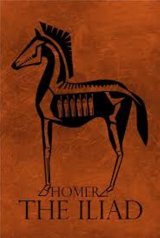Iliad
The Iliad is an ancient Greek epic poem in dactylic hexameter, traditionally attributed to Homer. Set during the Trojan War, the ten-year siege of the city of Troy (Ilium) by a coalition of Greek states, it tells of the battles and events during the weeks of a quarrel between King Agamemnon and the warrior Achilles.
BOOK I. ARGUMENT.(40) THE CONTENTION OF ACHILLES AND AGAMEMNON. In the war of Troy, the Greeks having sacked some of the neighbouring towns, and taken from thence two beautiful captives, Chryseis and Briseis, allotted the first to Agamemnon, and the last to Achilles. Chryses, the father of Chryseis, and priest of Apollo, comes to the Grecian camp to ransom her; with which the action of the poem opens, in the tenth year of the siege. The priest being refused, and insolently dismissed by Agamemnon, entreats for vengeance from his god; who inflicts a pestilence on the Greeks. Achilles calls a council, and encourages Chalcas to declare the cause of it; who attributes it to the refusal of Chryseis. The king, being obliged to send back his captive, enters into a furious contest with Achilles, which Nestor pacifies; however, as he had the absolute command of the army, he seizes on Briseis in revenge. Achilles in discontent withdraws himself and his forces from the rest of the Greeks; and complaining to Thetis, she supplicates Jupiter to render them sensible of the wrong done to her son, by giving victory to the Trojans. Jupiter, granting her suit, incenses Juno: between whom the debate runs high, till they are reconciled by the address of Vulcan. The time of two-and-twenty days is taken up in this book: nine during the plague, one in the council and quarrel of the princes, and twelve for Jupiter's stay with the Ćthiopians, at whose return Thetis prefers her petition. The scene lies in the Grecian camp, then changes to Chrysa, and lastly to Olympus. Achilles' wrath, to Greece the direful spring Of woes unnumber'd, heavenly goddess, sing! That wrath which hurl'd to Pluto's gloomy reign The souls of mighty chiefs untimely slain; Whose limbs unburied on the naked shore, Devouring dogs and hungry vultures tore.(41) Since great Achilles and Atrides strove, Such was the sovereign doom, and such the will of Jove!(42) Declare, O Muse! in what ill-fated hour(43) Sprung the fierce strife, from what offended power Latona's son a dire contagion spread,(44) And heap'd the camp with mountains of the dead; The king of men his reverent priest defied,(45) And for the king's offence the people died. For Chryses sought with costly gifts to gain His captive daughter from the victor's chain. Suppliant the venerable father stands; Apollo's awful ensigns grace his hands By these he begs; and lowly bending down, Extends the sceptre and the laurel crown He sued to all, but chief implored for grace The brother-kings, of Atreus' royal race(46) "Ye kings and warriors! may your vows be crown'd, And Troy's proud walls lie level with the ground. May Jove restore you when your toils are o'er Safe to the pleasures of your native shore. But, oh! relieve a wretched parent's pain, And give Chryseis to these arms again; If mercy fail, yet let my presents move, And dread avenging Phoebus, son of Jove." The Greeks in shouts their joint assent declare, The priest to reverence, and release the fair. Not so Atrides; he, with kingly pride, Repulsed the sacred sire, and thus replied: "Hence on thy life, and fly these hostile plains, Nor ask, presumptuous, what the king detains Hence, with thy laurel crown, and golden rod, Nor trust too far those ensigns of thy god. Mine is thy daughter, priest, and shall remain; And prayers, and tears, and bribes, shall plead in vain; Till time shall rifle every youthful grace, And age dismiss her from my cold embrace, In daily labours of the loom employ'd, Or doom'd to deck the bed she once enjoy'd Hence then; to Argos shall the maid retire, Far from her native soil and weeping sire." [Illustration: HOMER INVOKING THE MUSE.] HOMER INVOKING THE MUSE. The trembling priest along the shore return'd, And in the anguish of a father mourn'd. Disconsolate, not daring to complain, Silent he wander'd by the sounding main; Till, safe at distance, to his god he prays, The god who darts around the world his rays. "O Smintheus! sprung from fair Latona's line,(47) Thou guardian power of Cilla the divine,(48) Thou source of light! whom Tenedos adores, And whose bright presence gilds thy Chrysa's shores. If e'er with wreaths I hung thy sacred fane,(49) Or fed the flames with fat of oxen slain; God of the silver bow! thy shafts employ, Avenge thy servant, and the Greeks destroy." Thus Chryses pray'd.--the favouring power attends, And from Olympus' lofty tops descends. Bent was his bow, the Grecian hearts to wound;(50) Fierce as he moved, his silver shafts resound. Breathing revenge, a sudden night he spread, And gloomy darkness roll'd about his head. The fleet in view, he twang'd his deadly bow, And hissing fly the feather'd fates below. On mules and dogs the infection first began;(51) And last, the vengeful arrows fix'd in man. For nine long nights, through all the dusky air, The pyres, thick-flaming, shot a dismal glare. But ere the tenth revolving day was run, Inspired by Juno, Thetis' godlike son Convened to council all the Grecian train; For much the goddess mourn'd her heroes slain.(52) The assembly seated, rising o'er the rest, Achilles thus the king of men address'd: "Why leave we not the fatal Trojan shore, And measure back the seas we cross'd before? The plague destroying whom the sword would spare, 'Tis time to save the few remains of war. But let some prophet, or some sacred sage, Explore the cause of great Apollo's rage; Or learn the wasteful vengeance to remove By mystic dreams, for dreams descend from Jove.(53) If broken vows this heavy curse have laid, Let altars smoke, and hecatombs be paid. So Heaven, atoned, shall dying Greece restore, And Phoebus dart his burning shafts no more." He said, and sat: when Chalcas thus replied; Chalcas the wise, the Grecian priest and guide, That sacred seer, whose comprehensive view, The past, the present, and the future knew: Uprising slow, the venerable sage Thus spoke the prudence and the fears of age: "Beloved of Jove, Achilles! would'st thou know Why angry Phoebus bends his fatal bow? First give thy faith, and plight a prince's word Of sure protection, by thy power and sword: For I must speak what wisdom would conceal, And truths, invidious to the great, reveal, Bold is the task, when subjects, grown too wise, Instruct a monarch where his error lies; For though we deem the short-lived fury past, 'Tis sure the mighty will revenge at last." To whom Pelides:--"From thy inmost soul Speak what thou know'st, and speak without control. E'en by that god I swear who rules the day, To whom thy hands the vows of Greece convey. And whose bless'd oracles thy lips declare; Long as Achilles breathes this vital air, No daring Greek, of all the numerous band, Against his priest shall lift an impious hand;
Translation
Translate and read this book in other languages:
Select another language:
- - Select -
- 简体中文 (Chinese - Simplified)
- 繁體中文 (Chinese - Traditional)
- Español (Spanish)
- Esperanto (Esperanto)
- 日本語 (Japanese)
- Português (Portuguese)
- Deutsch (German)
- العربية (Arabic)
- Français (French)
- Русский (Russian)
- ಕನ್ನಡ (Kannada)
- 한국어 (Korean)
- עברית (Hebrew)
- Gaeilge (Irish)
- Українська (Ukrainian)
- اردو (Urdu)
- Magyar (Hungarian)
- मानक हिन्दी (Hindi)
- Indonesia (Indonesian)
- Italiano (Italian)
- தமிழ் (Tamil)
- Türkçe (Turkish)
- తెలుగు (Telugu)
- ภาษาไทย (Thai)
- Tiếng Việt (Vietnamese)
- Čeština (Czech)
- Polski (Polish)
- Bahasa Indonesia (Indonesian)
- Românește (Romanian)
- Nederlands (Dutch)
- Ελληνικά (Greek)
- Latinum (Latin)
- Svenska (Swedish)
- Dansk (Danish)
- Suomi (Finnish)
- فارسی (Persian)
- ייִדיש (Yiddish)
- հայերեն (Armenian)
- Norsk (Norwegian)
- English (English)
Citation
Use the citation below to add this book to your bibliography:
Style:MLAChicagoAPA
"Iliad Books." Literature.com. STANDS4 LLC, 2025. Web. 20 Jan. 2025. <https://www.literature.com/book/iliad_28>.




Discuss this Iliad book with the community:
Report Comment
We're doing our best to make sure our content is useful, accurate and safe.
If by any chance you spot an inappropriate comment while navigating through our website please use this form to let us know, and we'll take care of it shortly.
Attachment
You need to be logged in to favorite.
Log In